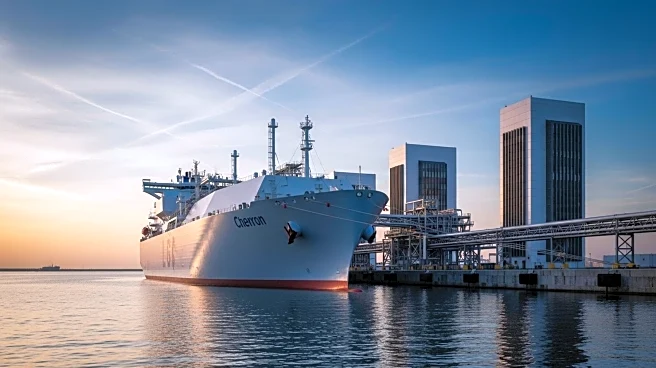What is the story about?
What's Happening?
Chevron, a major U.S. oil company, is in early discussions to explore opportunities in European regasification terminals. This move is part of Chevron's strategy to expand its presence in the global liquefied natural gas (LNG) market. The U.S. has become Europe's leading LNG supplier after the continent reduced its imports of Russian gas following the invasion of Ukraine in 2022. Chevron has signed long-term agreements with U.S. firms such as Energy Transfer, Cheniere, and Venture Global LNG to export 7 million tons of LNG per annum starting in 2026. The company is considering both existing and new infrastructure for regasification, with a focus on national security for Europe. Chevron is also looking at floating LNG options to support the expansion of Israel's Leviathan gas field.
Why It's Important?
Chevron's expansion into European regasification terminals is significant as it aligns with Europe's efforts to diversify its energy sources and reduce reliance on Russian fossil fuels. The move could enhance energy security for European nations and support the continent's transition to a more sustainable energy mix. For Chevron, this expansion represents an opportunity to strengthen its global LNG trading operations and secure long-term value through strategic partnerships. The development could also impact global energy markets by increasing competition and potentially lowering LNG prices, benefiting consumers and industries reliant on natural gas.
What's Next?
Chevron's discussions with European players around regasification are expected to continue, with potential announcements regarding specific projects or partnerships. The company may also explore further opportunities in the Eastern Mediterranean region, leveraging its existing assets to meet rising demand. European nations are likely to monitor these developments closely, considering the implications for energy security and market dynamics. Additionally, Chevron's strategic moves could prompt other energy firms to explore similar opportunities, further shaping the LNG landscape in Europe.
Beyond the Headlines
Chevron's focus on regasification terminals highlights the geopolitical dimensions of energy supply, particularly in the context of Europe's shift away from Russian gas. The company's involvement in the Eastern Mediterranean region underscores the importance of regional cooperation in energy development. This expansion could also influence environmental policies, as increased LNG capacity may necessitate considerations around emissions and sustainability. The long-term impact on global energy markets and geopolitical relations remains to be seen.















